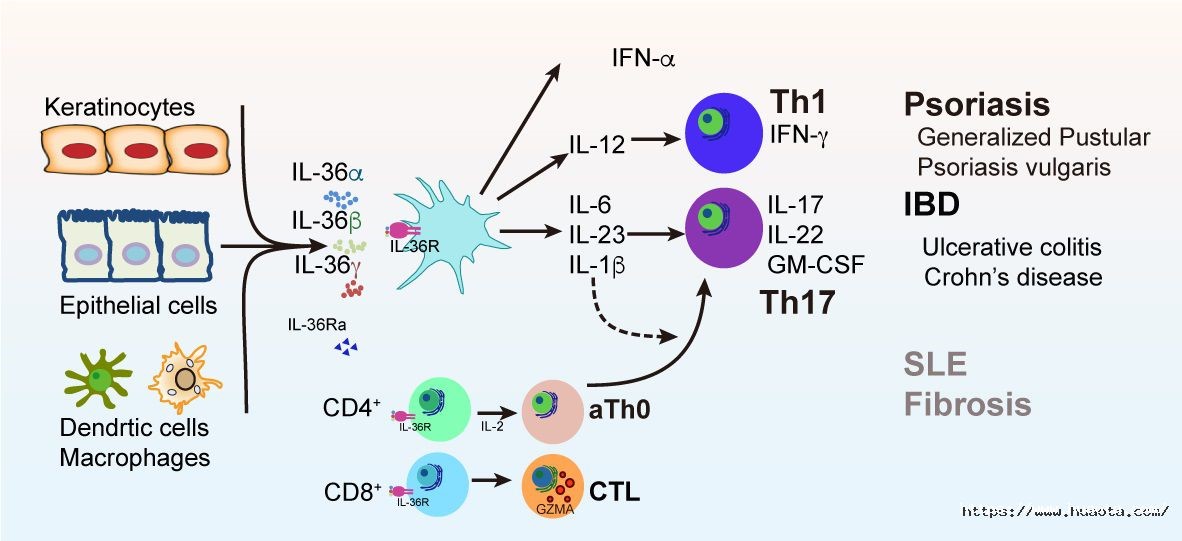NEWS & MEDIA
On December 9, 2021, Shanghai Huaota Biopharmaceutical Co., Ltd. announced that the company's self-developed HB0034, the anti-IL-36R humanized monoclonal antibody completed the first patient administration in New Zealand. The subject is currently in normal condition. The Phase Ia clinical trial carried out in New Zealand aims to evaluate the safety, tolerability, immunogenicity and pharmacokinetics of a single dose of HB0034 in healthy participants. HB0034 represents the first Ab targeting anti-IL-36R developed in China.
Dr. Zhu Xiangyang, CEO of Huaota, feels glad that HB0034 had been administered to the first participant, and he feels confident that the clinical trial of HB0034 will show efficacy and safety and become a better treatment option for patients with inflammatory immune diseases such as psoriasis (GPP).
IL-36R belongs to the IL-1 receptor family, also known as IL-1R6 or IL-1Rrp2, is a transmembrane protein whose extracellular part includes three immunoglobulin-like domains (immunoglobulin-like domain, Ig like domain), which is the binding region with ligand. The intracellular part of the receptor contains the TIR domain (Toll/interleukin-1 receptor domain, TIR domain), is the signal transduction zone. The results of expression profiling shows that IL-36R is mainly expressed in the skin, and also expressed to a certain extent in the esophagus, thyroid gland, salivary gland, tonsils and other tissues. The main cell types express IL-36R including epithelial cells, keratinocytes, human monocytes, macrophages and dendritic cells, etc.
IL-36R ligands include agonists IL-36α, IL-36β, IL-36γ, and antagonists IL-36Ra, IL-38. IL-36 cytokines are involved in some severe forms of psoriasis, including generalized pustular psoriasis (GPP) and palmoplantar pustulosis (PPP). GPP is a rare chronic skin disease in which the patient's skin turns red and develops symptoms such as sterile pustules, sudden fever, chills, and painful skin lesions. These conditions not only affect the patient's daily life, but also cause life-threatening organ failure and infectious complications. PPP is a chronic pustular psoriasis that affects the palms and soles. Current treatments for GPP and PPP include oral retinoids and topical steroids, but these treatments have poor efficacy and serious side effects.

HB0034 is a humanized IgG1 monoclonal antibody targeting IL-36R (interleukin-36 receptor). It has high affinity for IL-36R, can specifically bind to IL-36R and block IL-36 inflammatory pathway signaling. HB0034 binds to IL-36R and competitively blocks the binding of receptor agonists (IL36α, β and γ) to IL-36R, downregulates the downstream pro-inflammatory signaling pathways and pro-fibrotic signaling pathways, and inhibits epithelial cells/fibroblasts/immunne cell-mediated inflammatory response, thereby reducing the release of pathogenic cellular inflammatory factors in inflammatory diseases/skin diseases to control the disease.
Preclinical studies have shown that HB0034 can significantly inhibit imiquimod (IMQ)-induced skin erythema, dandruff and thickened psoriasis-like symptoms in cynomolgus monkeys, indicating that it has strong biological activity in vivo. At the same time, through the modification of the Fc segment, the ADCC and CDC functions of HB0034 were weakened or even eliminated to a certain extent, with good safety and tolerance, and it has great potential for development as an anti-inflammatory agent.
Up to now, there is no drug targeting IL-36R on the market. BI655130 (Spesolimab) of BI and ANB019 (Imsidolimab) of AnaptysBio are in later phases of clinical trials. They are in clinical trials for generalized pustular psoriasis (GPP), palmar pustulosis (PPP), atopic dermatitis (AD), ulcerative colitis, Crohn's disease, hidradenitis suppurativa and other diseases. Among them, the marketing application of BI's Spesolimab for the treatment of GPP has been accepted by the EMA.